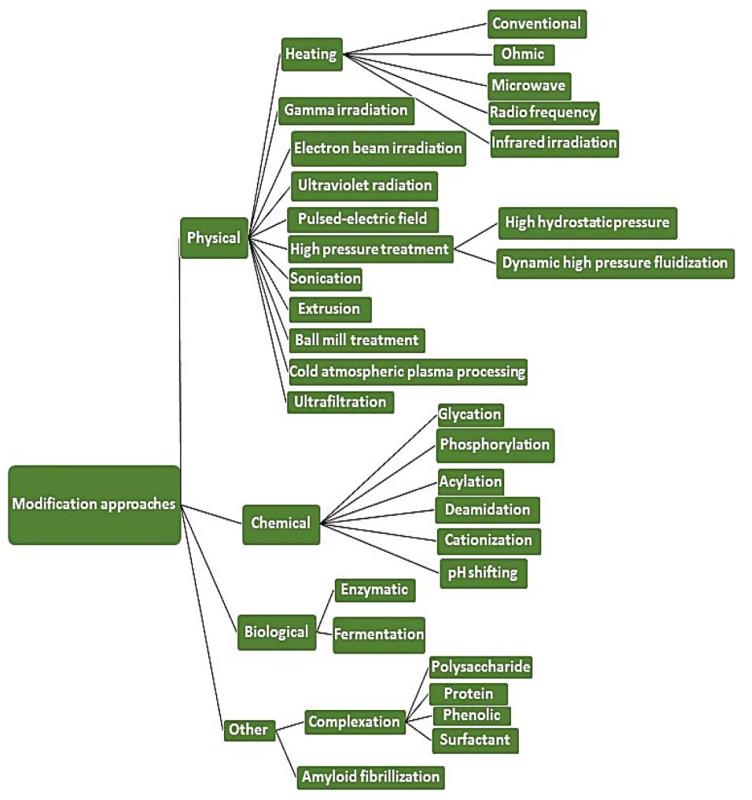Compared to their animal-based counterparts, plant-based proteins are widely used in plant-based meats due to their sustainable source, economic cost, and health benefits. However, most are functionally poor due to poor water solubility, complexity, and sensitivity to environmental stress conditions (e.g., pH, salt, and temperature), thus limiting their application. In addition, harsh protein isolation conditions can lead to denaturation, aggregation, and loss of function of some proteins. Due to aggregation, these non-functional proteins are usually insoluble and may have deleterious effects on the overall properties of the protein composition. Therefore, the modulation of plant proteins to improve their technology and plant meat applications and to make them more accessible for general use is highly sought after.
 Fig.1. Plant-based proteins modification approaches scheme. (Nasrabadi M N, et al., 2021)
Fig.1. Plant-based proteins modification approaches scheme. (Nasrabadi M N, et al., 2021)
To improve the functionality of plant-based proteins in plant-based meats, they need to be modified by altering the physicochemical properties of plant-based proteins. In plant-based meat, different protein modification methods affect the functional, nutritional, and organoleptic properties of plant-based proteins. Our team of experts develops different modification methods of plant-based proteins to physically, chemically, and biologically perturb protein structure and conformation to improve or create new functions.
Lifeasible is a leading partner in the modification of plant-based proteins for the plant-based meat industry. Our goal is to provide you with efficient and economical methods for modifying plant-based proteins to make their application in plant-based meats more feasible by improving their flavor, nutritional, and technical functional properties. Our strategies for the modification of plant-based proteins include:
Lifeasible offers the following physical methods for extending the functionality of plant-based proteins. No chemicals are used in the processing, avoiding the harmful consequences of possible chemical residues.
❖ Heat treatment, such as conventional heat treatment, ohmic heating, microwave heating, radio frequency treatment, and infrared irradiation.
❖ Gamma irradiation.
❖ Electron beam irradiation.
❖ Ultraviolet radiation.
❖ Pulsed electric fields.
❖ High pressure treatment, such as high hydrostatic pressure and dynamic high pressure fluidization.
❖ Ultrasonic treatment.
❖ Extrusion.
❖ Ball mill treatment.
❖ Cold atmospheric pressure plasma treatment.
❖ Ultrafiltration.
Lifeasible offers the following methods for the chemical modification of plant-based proteins by adding new functional parts or removing components from the protein structure. The advantages of this method are high efficiency, low cost, and ease of operation.
❖ Glycosylation.
❖ Phosphorylation.
❖ Acylation.
❖ Deamidation.
❖ Cationization.
❖ pH shift treatment.
Lifeasible offers biomodification techniques that rely on enzymatic and fermentation processes to modulate the functionality of plant-based proteins while also improving their nutritional quality, including digestibility, bioavailability, and antioxidant and antimicrobial properties. This approach is environmentally friendly and low energy consumption and does not produce toxic by-products.
❖ Enzymatic modification.
❖ Fermentation.
❖ Complexation. We complex plant-based proteins with other substances (proteins, polysaccharides, phenolics, surfactants) to modulate protein function.
❖ Amyloid fibrillation.
The rational design of plant-based proteins with functional properties opens up new opportunities in the field of plant-based meat. Lifeasible has cutting-edge technology, state-of-the-art methods, and innovative solutions. We guarantee to provide you with the most professional solutions for modifying plant-based meat proteins at competitive prices, with short turnaround times and reliable results. Feel free to contact us for more information.
Reference
Lifeasible has established a one-stop service platform for plants. In addition to obtaining customized solutions for plant genetic engineering, customers can also conduct follow-up analysis and research on plants through our analysis platform. The analytical services we provide include but are not limited to the following:
STU-CRISPR System Improves Plant Genome Editing Efficiency
April 19, 2024
Application of Exosomes in Facial Beauty
April 12, 2024